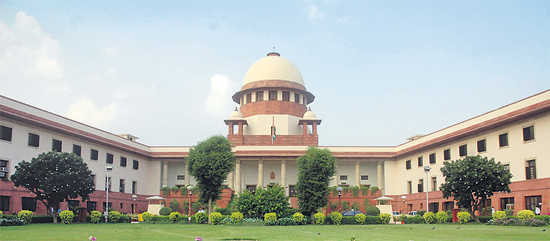New Delhi, October 08: The Supreme Court has expressed displeasure over the filing of an affidavit on behalf of a lower-level officer of the Ministry of Information and Broadcasting (MIB) over petitions, denoting the reporting of the Tablighi Jamaat case as false and communal.
Chief Justice of India (CJI) SA Bobde asked that the senior officer to file an affidavit. The court said that the fundamental right to freedom of expression is being abused the most nowadays. The case will be heard after two weeks.
The court said that the affidavit is trying to shake off responsibility.
Solicitor General Tushar Mehta said that the Secretary of the Ministry of Information and Broadcasting will file the affidavit.
The Supreme Court then said that the government should tell who made the objectionable reporting during that period and what action was taken against them.
The Central Government had said during the last hearing on August 7 that the ban on media would be a violation of freedom of expression. The prohibition on reporting of Tabligi Jamaat would violate the right of the common people and journalists to know about the happenings in society.
During the hearing, the National Broadcaster Association (NBA) said that it has issued a notice regarding complaints of media reporting on the Tabligi Jamaat.
Advocate Dushyant Dave had said on behalf of the petitioner that the National Broadcaster Association and the Press Council of India had no right to issue the order.
Then the Chief Justice had said that we will pass the order. Then Dave had said that the government has not done anything on this till now. Then the Chief Justice had said that as far as our experience they will do nothing till we give instructions.
The petition has been filed by Jamiat Ulema-e-Hind.
While hearing the petition, the court has issued a notice to the Central Government and the Press Council of India.
The petition sought to define the definition of ‘freedom of the press’. During the hearing on May 27, the CJI had asked the Central Government not to allow people to incite law and order issues. These are things that later become an issue of law and order.
Hearing this petition on April 13, the Supreme Court refused to give any interim order.
During the hearing, the Chief Justice had said that it is the job of the Press Council to look into it. You make the Press Council a party. Then there will be a hearing. The court said that we will have to take some long-term and concrete steps for the news.
During the hearing, Jamiat’s lawyer had told the court that in the media reporting and the government’s report, it was being said that Tabligi spread coronavirus.
On behalf of Jamiat it was said that there were incidents of violence in Karnataka, because the names of some people were made public.
Then the Chief Justice had said that if the case is for killing and defamation, then you have to go elsewhere but if the matter is about reporting on a large scale, then make the Press Council a party to it.





